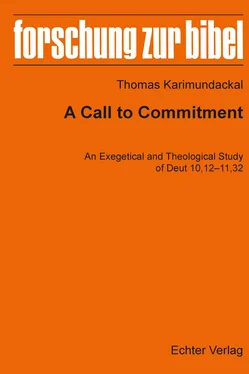119The singular המצוה may stand for the commandments in general as in 5,31; 6,1 and 7,11. The expansion attested in 4QDeut jand 4QDeut k1(החקים והמשׁפטים) may well have come from the above mentioned parallel passages. LXX routinely translates כל־המצוה with the plural form (cf. 6,25; 8,1; 15,5; 27,1).
120LXX reads למען תחזקו as ἵνα ζῆτε καὶ πολυπλασιασθῆτε. This is in conformity with 8,1 למען תחיון ורביתם (cf. 4,1; 16,20).
121הארץ functions here as a rhetorical absolute. Similar fronted pendant constructions with nominal elements in extraposition can be seen in 7,15a; 10,9b. Similarly, with adverbial elements in extra position, it can be seen in 11,13b; 11,29b, cf. WILLIAMS, Syntax § 35.
122The idiom והשׁקית ברגלך may refer to the irrigation method used in Egypt where the water wheel is operated by foot, cf. MCCARTHY, BHQ, 82, and DRIVER, Deuteronomy, 129. LXX changes the verb into third person plural for the entire ὅταν clause.
123LXX’s reading of εἰσπορεύῃ instead of עברים is in tune with the preceding verse.
124The presence and absence of the definite article with שׁנה is odd. This imbalance is corrected in Smr by placing the definite article in both the instances.
125With ונתתי, the narrative in v14-15a makes a shift from Moses’ reference to Yhwh in the 3 rdperson to Yhwh himself speaking in the 1 stperson. LXX and Smr have removed the inconsistency by substituting the 3 rdperson throughout.
126The LXX’s treatment of the bound phrase מטר־ארצכם, ὑετὸν τῇ γῇ σου makes sense since the rain is ‘for the ground’ and not ‘of the ground’.
127Most of the English versions translate תירושׁ as wine or new wine (cf. NRSV, KJV, NAS, NAU, NET, NIV, NLT, etc.). However, the etymology of תירושׁ is not certain. HALOT II, 1727, states that “there is no Semitic etymology for תִּי ר(וֹ)שׁ but it has been introduced into Hebrew as a cultural word from the Mediterranean area”. For example, RABIN, Words, 137-138, suggests that it is a loanword from hieroglyphic Hittite tuwarsa (wine), occurring in Greek as Θύρσος. HALOT II, 1727-28, suggests three possible meanings for 1 :תירושׁ) Deriving from the Semitic root ירשׁ, it would mean “to tread down” or “to drive out” or “to press wine”, cf. HAUPT, Notes, 223; HAUPT, Etymologies, 215. 2) As a word in the cognate languages תירושׁ would mean unfermented wine or must, cf. DALMAN, Wörterbuch, 442a. 3) As a substantive in Hebrew it would mean sweet wine or must ,cf. CLASSEN, Text, 298. Considering the context of gathering grain and oil in v14c, it is better to translate תירושׁ as ‘must’ referring to unfermented or fresh wine.
128The sequence in the exhortation witnesses another shift from 15b as it renders the second person singular ואכלת ושׂבעת. LXX makes use of the participles φαγὼν and ἐμπλησθεὶς for these finite verbs and subordinates them to πρόσεχε in v16. Though השׁמח־ is plural in MT, LXX does not change it to the plural until v16b with παραβῆτε.
129The absence of the definite article in דברי אלה could be explained by the presence of the suffix, cf. GKC, 112y. This variation stands in contrast to הדברים האלה of 6,6.
130טוטפת is a rare word, meaning “frontlets, phylacteries” occurring only three times in the OT (Deut 6,8; 11,18; Exod 13,16; cf. HALOT I , 373). According to Gamberoni, “the defective Masoretic spelling, the use of a corresponding singular in Ex 13,9, and the Greek, Syriac and Vulgate suggest the possible assimilation of a segholate singular ending to the preceding אות”, GAMBERONI, 320 ,טוטפת. The LXX translation of טוטפת is rather ambiguous. LXX uses an adjective ἀσάλευτον, meaning “immovable” to translate this rare word, which in itself does not convey the meaning of טוטפת, cf. WEVERS, Notes, 117.
131The usual translation of לדבר בם “talking of them” (NAU, RSV, NRSV), “speaking of them” (KJV, NAS), “and speak of them” (NET, NIB, NIV), “and keep on telling them” (NJB) is less challenging. Since 11,18-21 is almost an exact repetition of 6,6-9, the translation of לדבר בם should follow the context of ודברת בם in 6,7, cf. FISCHER-LOHFINK, Worte, 190-191. In the context of teaching Torah to the children, לדבר בם could be translated as “by reciting them” as a way of instructing the children. The children should learn the Torah by seeing their parents reciting it. The gerundive use of לדבר בם depends on למד in v19a and consequently Israel remains as the subject of the infinitive construct לדבר. For a detailed discussion of various linguistic and cultural elements related to the translation of ודברת בם in 6,7 and לדבר בם in 11,19, cf. FISCHER-LOHFINK, Worte, 181-203.
132LXX reads שׁמר תשׁמרון as ἀκοῇ ἀκούσητε. LXX follows closely 11,13 and replaces תשׁמרון שׁמר with שׁמע תשׁמעו, making 11,22-25 parallel to 11,13-21, whereas MT’s usage is in tune with 6,17. Thus, the LXX makes a change in the verb שׁמע/שׁמר probably to indicate that by obeying the commandments Israel will not only gain prosperity and longevity but will also conquer the Promised Land, cf. WEINFELD, Deuteronomy 1-11, 431. Therefore the LXX reading could be more theological in nature. Smr, LXX and Syr have also added היום to אתכם מצוה as in v13.27 and 28.
133MT has מן־המדבר והלבנון as in Josh 1,4. However, Josh 1,4 continues with ועד־הנהר הגדול. The problem arises partly due to the double occurrence of מן while ועד occurs just once. Many scholars propose to incorporate a second ועד before הלבנון, cf. BHS; MCCARTHY, BHQ, 83; DRIVER, Deuteronomy, 131; NIELSON, Deuterononmium, 127; MCCONVILLE, Deuteronomy, 196. Lohfink suggests moving the Atnach to והלבנון to avoid the confusion. This would allow reading the text as “from the wilderness and the Lebanon”, cf. LOHFINK, Samen, 204. While Lohfink’s suggestion seems to be convincing, Josh 1,4 might have read the text in a slightly different way.
134A few Hebrew Mss, Tg J, Vg and LXX read הנהר הגדול as in 1,7; Gen 15,18; Josh 1,4. Since this verse is intrinsically related to 1,7 and Josh 1,4, OTTO, Deuteronomium, 1017, suggests the possibility of a homoioarkton as in the case of 34,2.
135Smr, LXX and Syr read singular אלון מורה as in Gen 12,6 instead of MT’s אלוני מרה. MT’s reading corresponds with Gen 13,18; 14,13 and 18,1 (באלני ממרא), but does not replace מרה with ממרא as in the case of Syr and T J. Thus a comparison of Gen 12,6 vs 13,18; 14,13 and 18,1 shows a logical incongruity between Oaks of Moreh, located in Shechem, and Oaks of Mamre, located in Hebron. Smr further adds “in front of Shechem” at the end of the verse. The Smr reading reflects the Samaritans’ belief that Shechem is the chosen place of worship. MCCARTHY, BHQ, 83, suggests that the addition of “in front of Shechem” at the end of the verse “is to neutralize the earlier phrase ‘in front of Gilgal’”. Driver understands מרה as an appellative referring to the authoritative direction given by priests to those coming to consult the oracle, cf. DRIVER, Deuteronomy, 134. LXX’s rendering of מרה (τῆς δρυὸς τῆς ὑψηλῆς) is also ambiguous. WEVERS, Notes, 204, suggests that, “the translator(s), not recognizing the place name Moreh, tried to make sense out of the name by transposing it as רמה, hence ὑψηλῆς”.
Читать дальше












